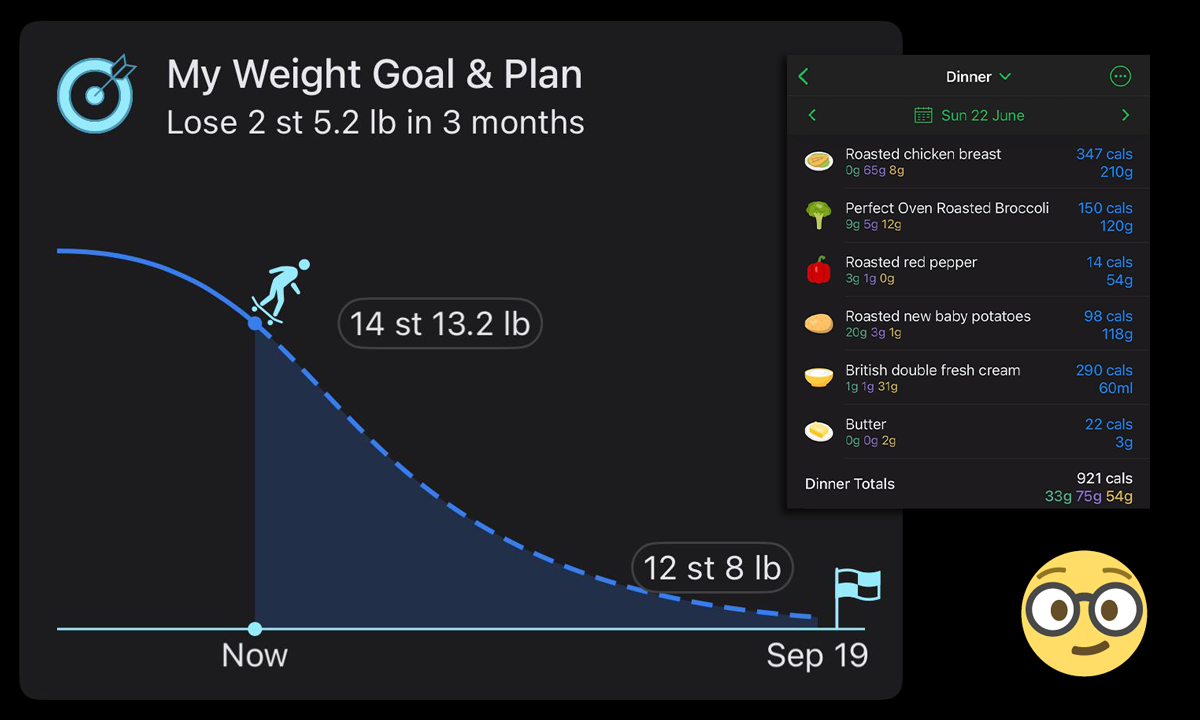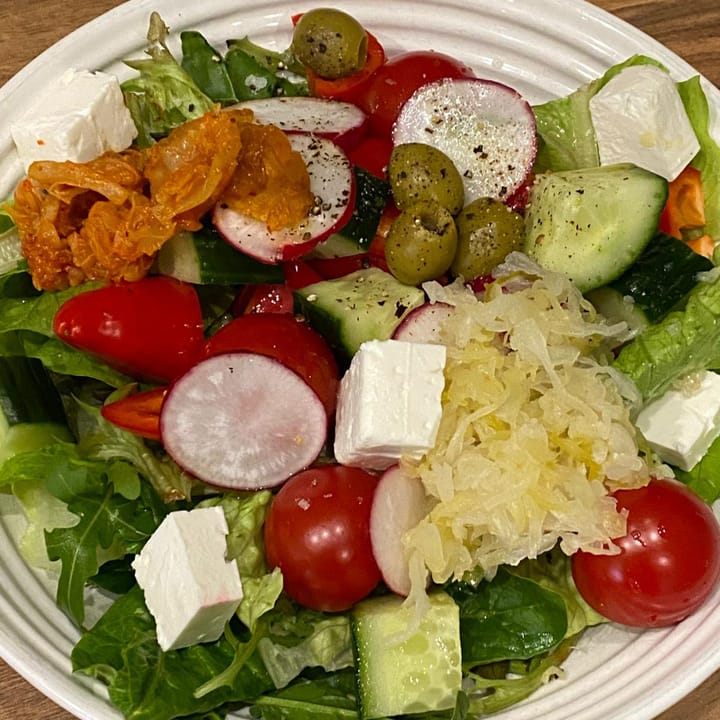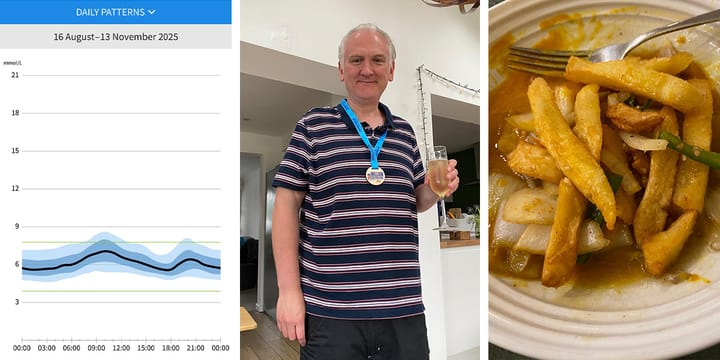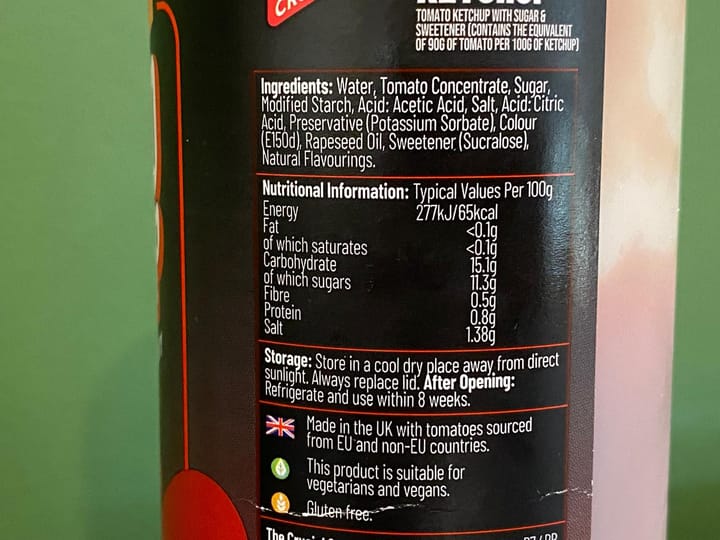Protein leverage, Food logging and osmotic pressure
Daily food logging can help you lose twice as much weight, The Protein Leverage Hypothesis, and Osmotic Pressure causing metabolic chaos...

What I learned this week #4
The Protein Leverage Hypothesis
Whilst listening to 'Good Energy' by Dr Casey Means, I was inspired to go and look up Kevin D. Hall's research that shows that eating a primarily ultra-processed food (UPF) diet tends to increase daily calorie consumption by 500 calories per day. Kevin's research puts forward the 'Protein Leverage Hypothesis' as a possible reason for the lower overall energy consumption when eating whole foods, because the protein content hasn't been degraded or removed.
"The remarkable stability of absolute protein intake between the diets, along with the slight reduction in overall protein provided in the ultra-processed versus the unprocessed diet... suggests that the protein leverage hypothesis could partially explain the increase in energy intake with the ultra-processed diet in an attempt to maintain a constant protein intake"
Hall, Kevin D. et al.Cell Metabolism, Volume 30, Issue 1, 67 - 77.e3
But what is the Protein Leverage Hypothesis?
It's a theory (it's not been conclusively proven) that humans and other mammals will continue to seek out and consume food until their daily protein needs have been met. Think of it as all of your cells being hungry and they're doing everything they can to tell your brain that they need more protein (raw building material) to repair and replace themselves. Cells are good at driving hunger signals, but they're not good at communicating exactly what food (nutrients) they need. They're just screaming that they're hungry, so you'll be inclined to seek out whatever food is looking most palatable, and UPF offers convenience and hyperpalatability even if they tend to be much more protein deficient. The Protein Leverage Hypothesis suggests that you'll keep eating any kind of food until you've met your protein requirement, so this will include additional carbohydrates and fats that you wouldn't have been driven to eat otherwise. That's why this protein leverage force is considered to contribute to the extra 500 calories per day of overconsumption on a UPF diet.
If a product has 'high protein' on the label that just screams UPF. Steak, eggs and chickpeas don't do that because it's obvious that they're high in protein and there's no need to pay for marketing to promote them as such. I generally believe that food in powdered or liquid form, when combined with additives such as emulsifiers, flavourings and industrially derived extracts makes it difficult for your body to absorb essential nutrients. We didn't evolve to eat glue and dust.
A daily food and drink log can help you lose twice as much weight
Another fact that struck me while listening to Dr. Casey is that people who log their food intake tend to lose twice as much weight as those that don't. That's quite a remarkable statistic so I think it's worth publicising that as much as possible in the fight against obesity and type 2 diabetes.
I've been logging my food intake passively on my LibreLink CGM app for about eight months and I haven't really been monitoring my weight during most of that time, but I'm pretty sure I've not been gaining any. It's been good for looking at what may cause spikes in blood glucose, but it's not easy to get a more high level view of daily macros etc. so I've started logging both food and drink, first with ChatGPT and since that failed spectacularly by losing all my data, I've moved onto MyNetDiary which doesn't show the glucose spikes but does provide a much clearer and easy format to view food and drink intake. It can also automatically log my daily steps and I manually enter my weight and 7-day average glucose levels. This information is proving incredibly useful in finding patterns and seeing my general progress.
That's over 3% of my overall body weight lost with the help of better food and drink logging. I haven't done that through fussing about calorie intake or feeling hungry for any considerable length of time - I've just continued to cut the carbs and prioritise protein and fat.
Why it works
- Recording makes overconsupmtion immediately obvious. Without logging its very easy to underestimate or 'forget' what you've previously had during the day. Before logging my drinks on MyNetDiary I honestly couldn't tell you how many glasses of wine I might have had the night before.
- Self-authorship... (or the non-technical version... It's a pain in the ass!) If you're making an considerable effort to record what you're consuming, it will increase the weight of importance that your mind grants to your daily food and drink. Ideas rattling around your head can easily be lost in the myriad of other noisy thoughts fighting for attention. Writing things down makes them 'real' in the external world.
- Easier to pin-point cause and effect. If your blood glucose levels, weight or whatever you're monitoring, are going in the wrong direction, you're going to be able to review what foods and drinks may be causing that. You can also evaluate the effectiveness of reducing, removing or swapping those items from your diet.
- Better nutrient control. I'm mainly interested in reducing carbohydrates as I want to maintain nutritional ketosis. Being able to monitor how many grams of carbs per day I'm consuming is a great help. It's also interesting to monitor fat and protein levels as I try to fine-tune these. You can also monitor micronutrients (things like electrolytes) if you're prepared to put the time in adding the data in for each food.
- Social pressure. This one's not for the faint-hearted and I'd advise you don't put this pressure on yourself unless you really feel ready to so, and especially when you first start out. If you make your food and drink log public on a blog or social media (or even just share with your family), it adds even more motivation for you not to over-indulge. I really don't want you lot to know how much wine I was drinking before I started doing this, so now I have an external reason to cut down instead of just "I'll make a start on that tomorrow/next week etc."
Osmotic Pressure
Another nerdy (but important) tangent came from reading 'Pure, White and Deadly' by Professor John Yudkin, a British scientist who worked tirelessly on the idea that dietary sugar was a major risk factor for coronary heart diesease in opposition to Ancel Keys' Diet-Heart Hypothesis which pointed the finger of blame at saturated fat.
"Numerous observational, epidemiological, interventional, and autopsy studies have failed to validate the Keys equation and the lipid–heart hypothesis. Nevertheless, these have been the cornerstone of national and international dietary guidelines which have focused disproportionately on heart disease and much less so on cancer and metabolic disorders, which have steadily increased since the adoption of this hypothesis."
I love how Yudkin refers to Keys as 'An American scientist' when he rubbishes his statement about sugar consumption not contributing to increased trigliceride levels. This subtle savageness is a great example of a good British put-down. It's not Keys' nationality being poked at, Yudkin is declining to mention his name as a mark of contempt for his flawed logic in assiging 125 grams of sugar intake per day as in any way normal.
"...sugar produces no increase in triglyceride if the amounts taken are of the same order of magnitude as the average sugar intake of the American population."
Ancel Keys
The sentence that sent me off on a tangent in Yudkin's book was during a passage outlining the properties of sugar that make it an attractive ingredient for the food industry, and he only makes a passing reference to its use as a preservative in addition to its use in jams...
"...and on its high osmotic pressure, which inhibits the growth of moulds and bacteria."
So what is Osmotic Pressure?
Osmotic pressure is a force that increases the amount of water pushed through a cell wall (membrane) due to a higher solute concentration via osmosis. A solute is something that can be dissolved in water such as salt or sugar molecules and a higher concentration of those on the other side of a cell wall causes water molecules to move towards the other side of the wall in a process called osmosis.
So increased osmotic pressure caused by excessive blood glucose could very likely be contributing to mitochondrial metabolic disfunction and damage. Mitochondria are symbiotic, energy producing cells that live inside animal cells. They are descended from pre-historic bacteria and have hitched a ride alongside living organisms. They are closley related to bacteria so common sense thinking would imply that whatever can damage bacteria will also damage mitochondria, if it's able to penetrate their host animal's cells.
Anything that kills bacteria is therefore unlikely to be a healthy food source. Antibiotics can be helpful in eliminating dangerous bacteria if you're experiencing an acute risk of death, e.g. sepsis, leporacy or tuberculosis, but are unwisely given to people with viral infections and fed to livestock resulting in uneccessary decimation of our gut microbiomes and possibly damaging our mitochondria.

Sponsored
I struggled to find where to buy non-homogenised milk locally and eventually found The Modern Milkman. Their organic whole milk in my area is non-homogenised so I've been getting milk and eggs from them for two yeas now. Use this link to get 50% off your first two weeks and they'll give me 50% off my next delivery as well. Cheers!


